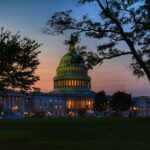Libertarian SCOTUS Review: School Choice
The Supreme Court made waves in its recent session. Unfortunately, our news media fails in its reporting on these cases. They focus solely on the outcomes and political ramifications with little care or concern for the legal matters under dispute. I will rectify this situation by illuminating the legal matters under dispute, helping libertarians think through these tough issues. Today we will focus on the school choice case titled Carson v. Makin.
To understand Carson v. Makin, we need to look at precedent. In 2017 the Supreme Court ruled on Trinity v. Comer which involved playground resurfacing projects funded by.the state of Missouri. Missouri claimed that they could only fund playground resurfacing projects for secular schools, not religious schools. The Supreme Court found that the law Missouri cited violated Trinity’s Free Exercise rights under the 1st Amendment. How did they reach this conclusion? The court ruled that the state cannot deny religious organizations access to general government benefits. Penalizing institutions for their religious status harms the free exercise of religion.
In the 2019 case Espinoza v. Montana the Supreme Court built upon the precedent set in Trinity. The state of Montana created a tax credit system for taxpayers who donated money to private or nonprofit scholarship organizations. Montana then barred the tax credits from funding religious schools. Similar to the Trinity case, the court ruled that excluding religious institutions from the tax credit system, because of said institution’s religious status, constitutes a violation of the Free Exercise clause of the 1st Amendment.
This series of cases culminates in Carson v. Makin. According to the 2010 U.S. Census Maine is the most rural state in the U.S.. Because of this, Maine allows school administrative units (SAU) without their own local school to contract with other public schools or approved private schools. Maine stipulates that an approved private school must be secular. Just like in our previous two cases, Maine attempted to bar religious organizations from a neutral government program. The Supreme Court ruled that Maine’s secular school rule violated the Free Exercise clause of the 1st Amendment.
What should libertarians think about Carson v Makin? Akhil Amar provides us two schools of thought, separation vs. equality. The separation school claims history proves that governmental power mixed with religion always leads to the abuse of liberties. History compels us to erect a thick wall of separation between religion and state. The 1973 case Lemon v. Kurtzman created the best distillation of this thick wall. It resulted in the Lemon test which stated that legislation pertaining to religion must possess a secular intent, neither further or harm religion, and avoid an “excessive government entanglement” with religion.
The equality school responds that equality is a bedrock principle of the American founding. Justified fear of religion using and abusing state power should not uphold state discrimination against religion. One should feel protected from the alchemical reaction between the state and religion because the entire legal community would rule a law unconstitutional if it compels support of a religious entity, decides membership or teaching of religious entities, grants state power to religious entities, or grants support to specific religious entities and not others.
I feel adequately protected by the Establishment Clause’s robust consensus. Because of this I am happy to see the Supreme Court develop a more robust Free Exercise Clause. I agree with the current Supreme Court majority that penalties applied specifically to religious institutions harm the free exercise of religion, but I understand libertarians who disagree. As libertarians we find ourselves on many sides of current debates and I expect to see libertarians on both sides of this debate.




